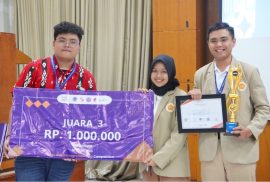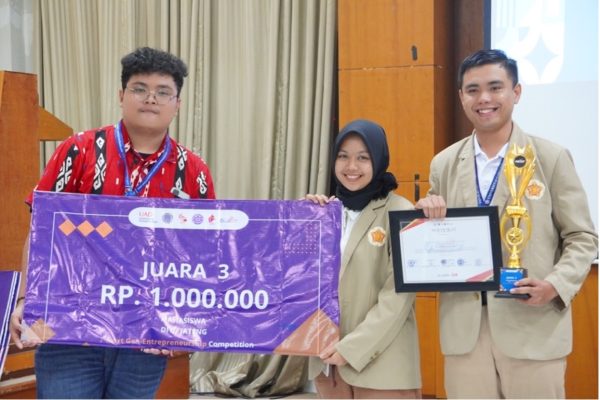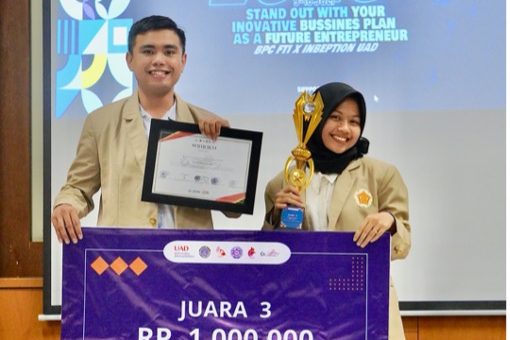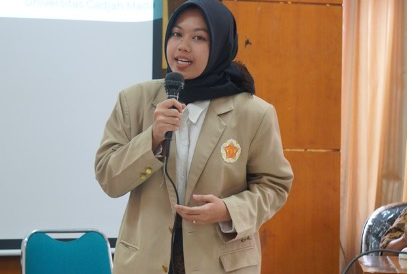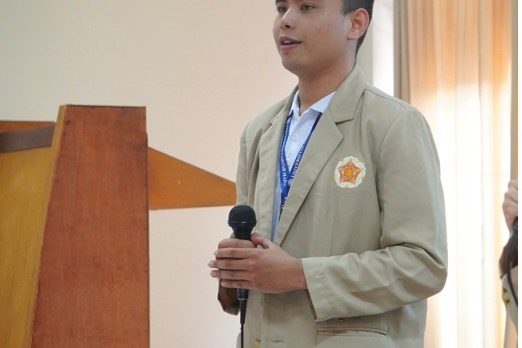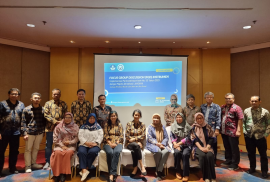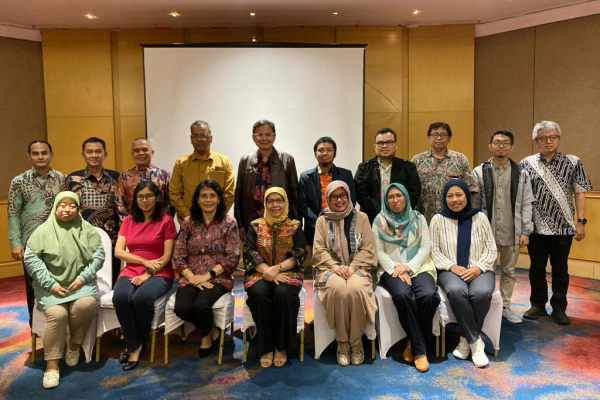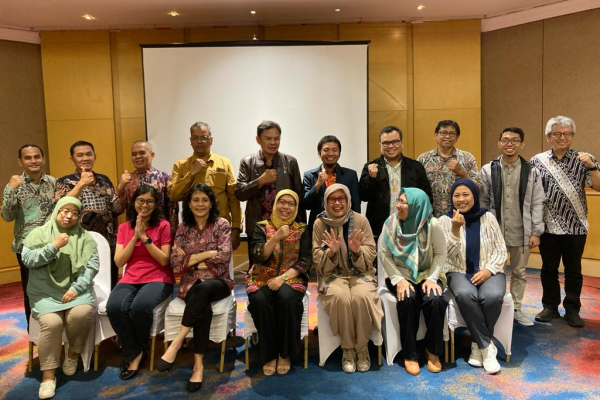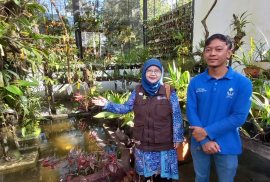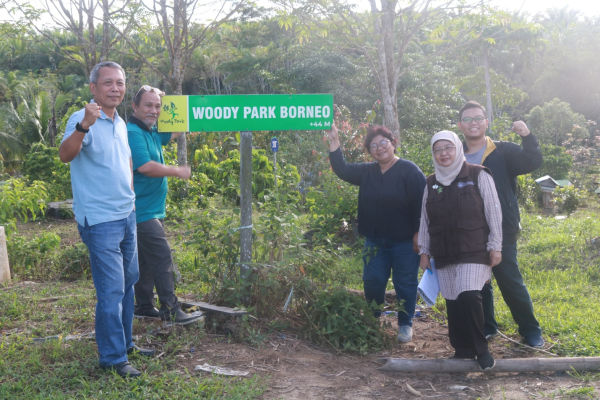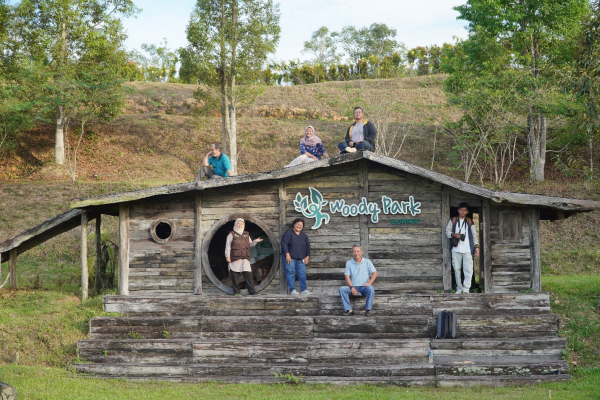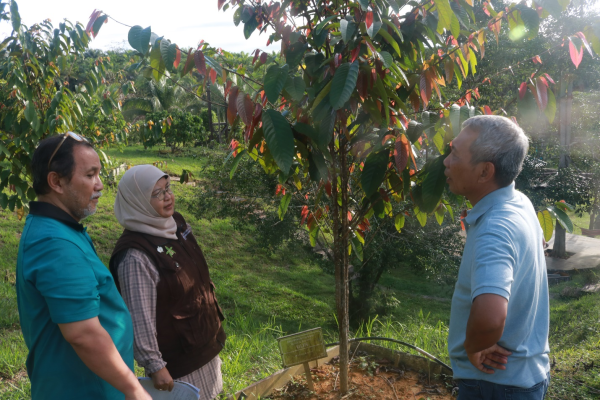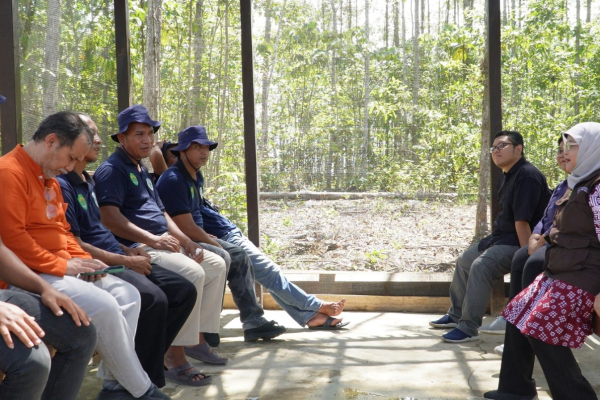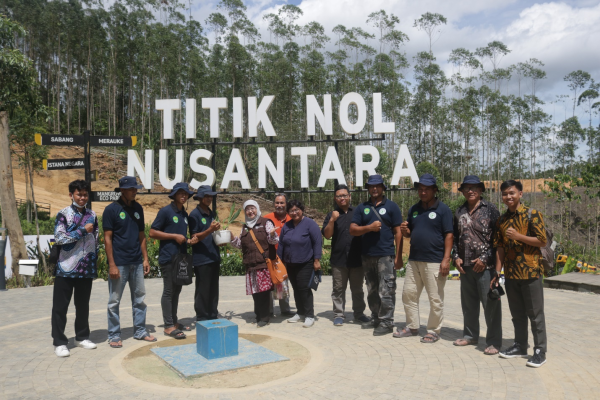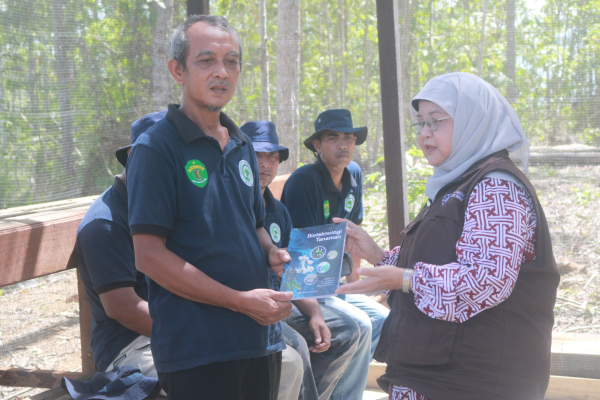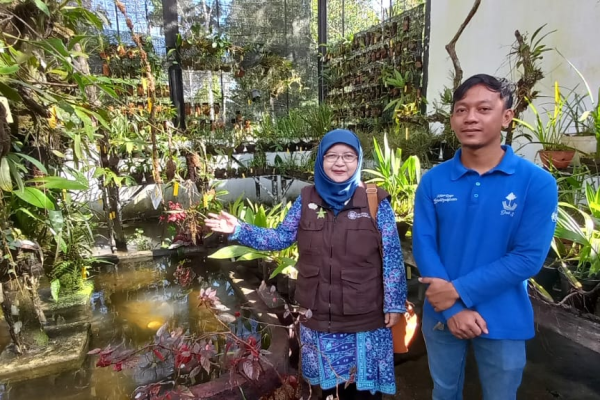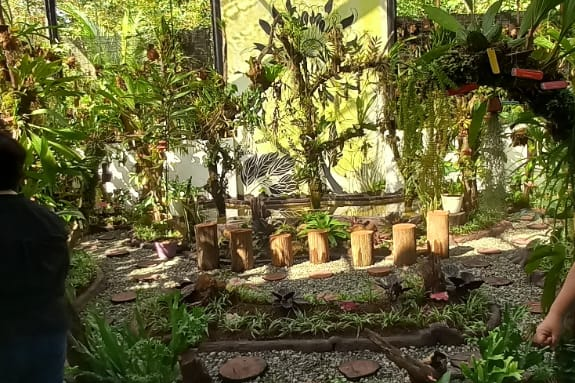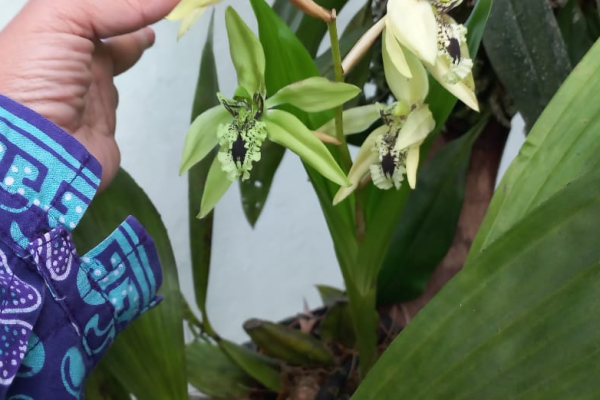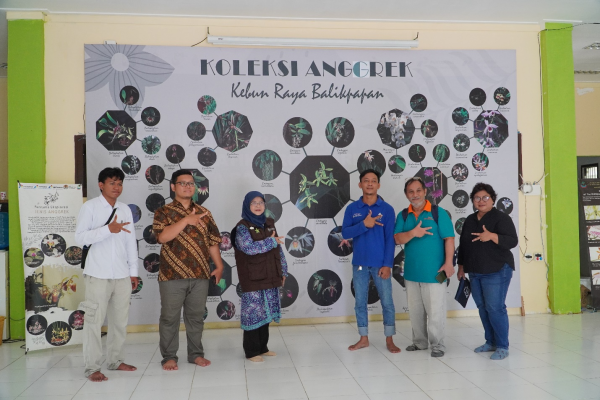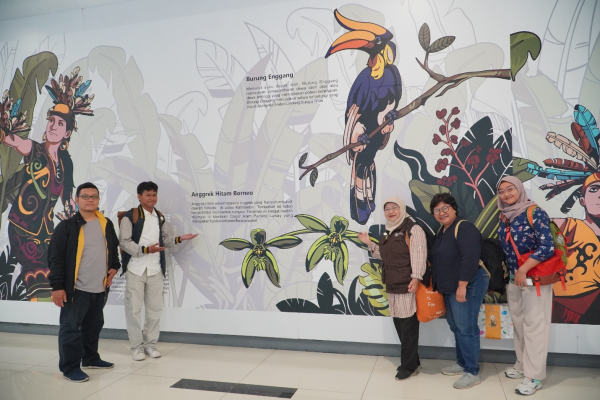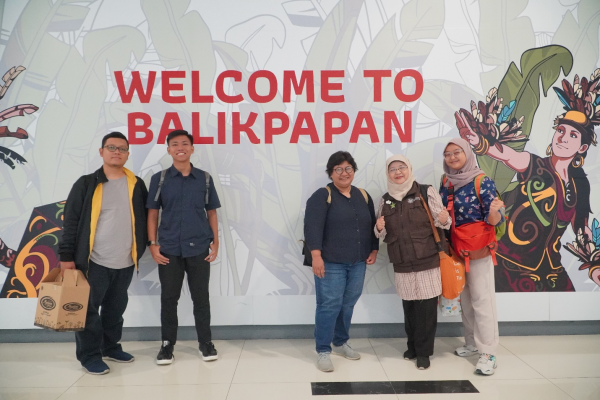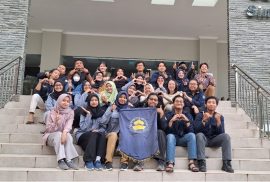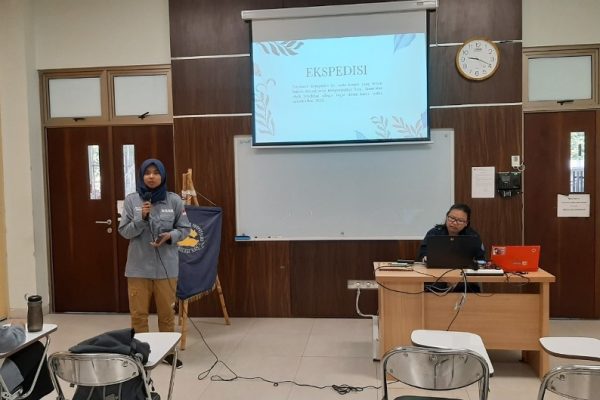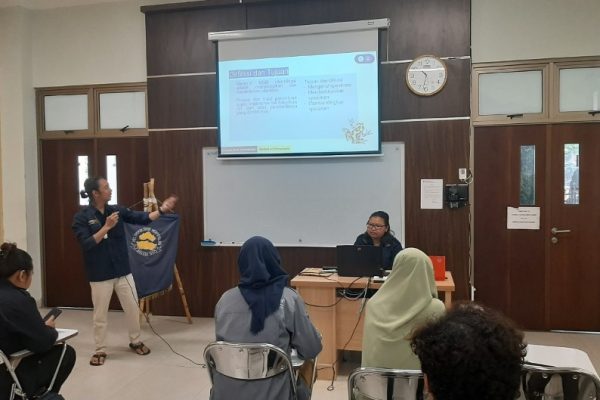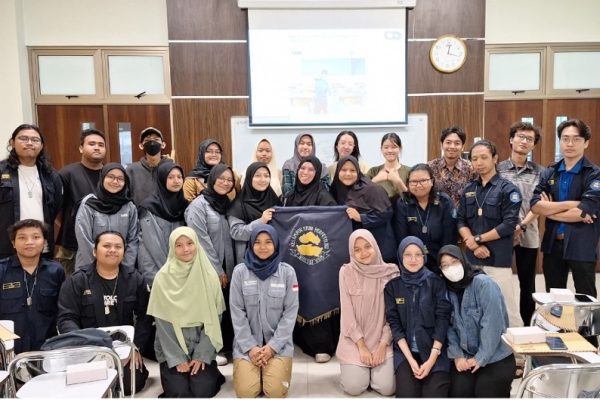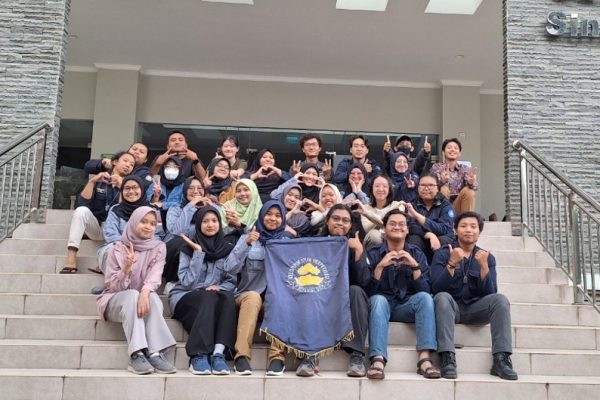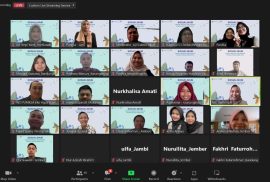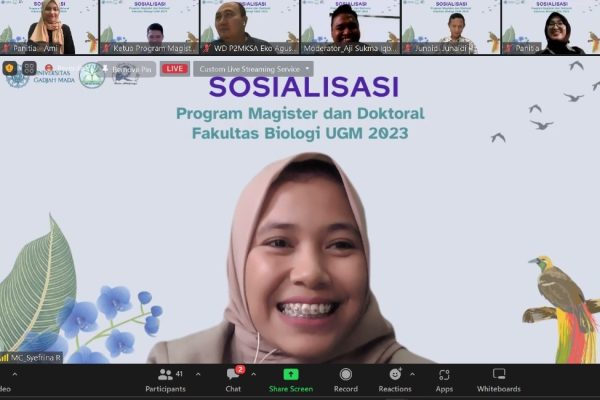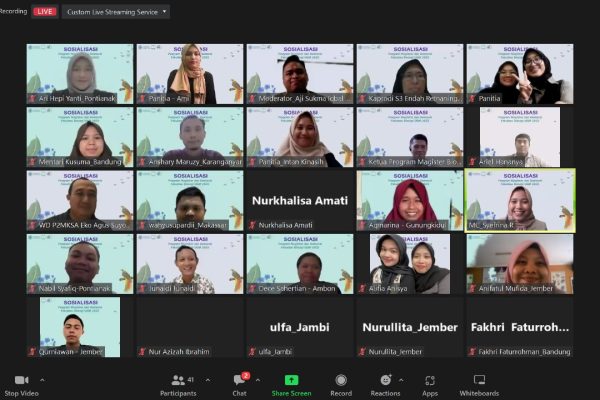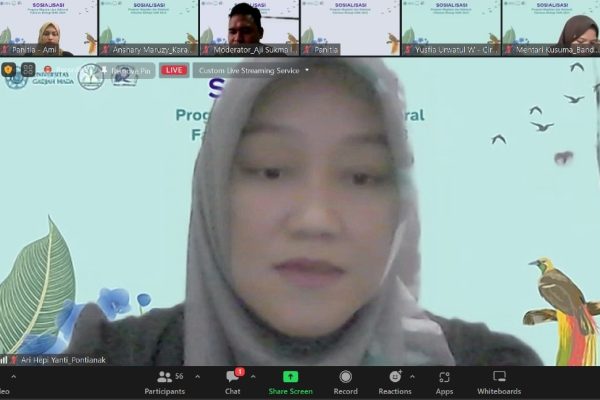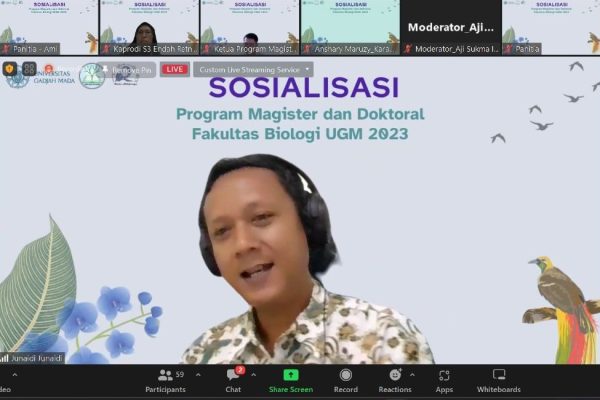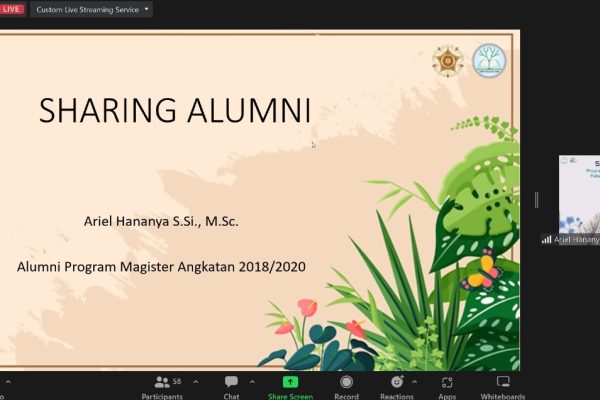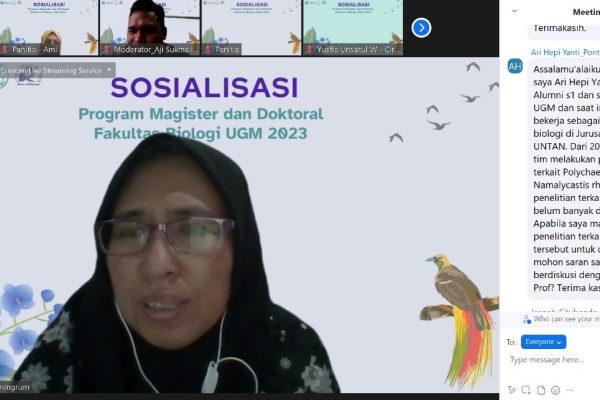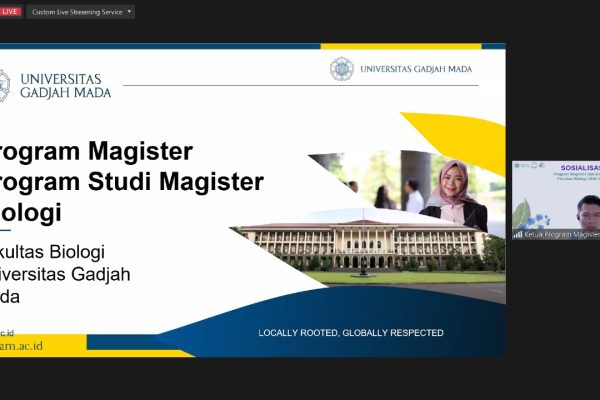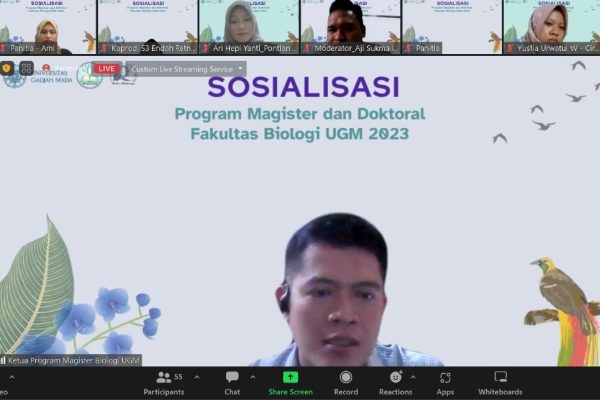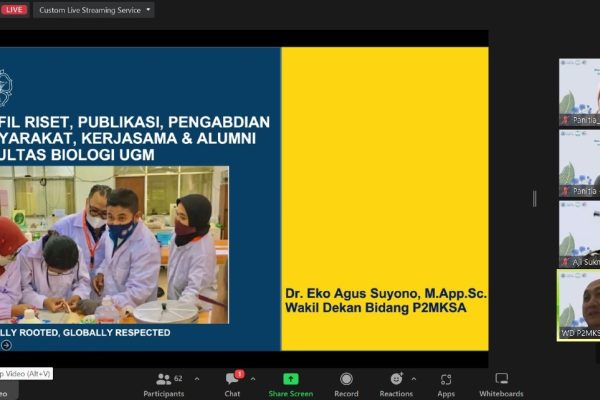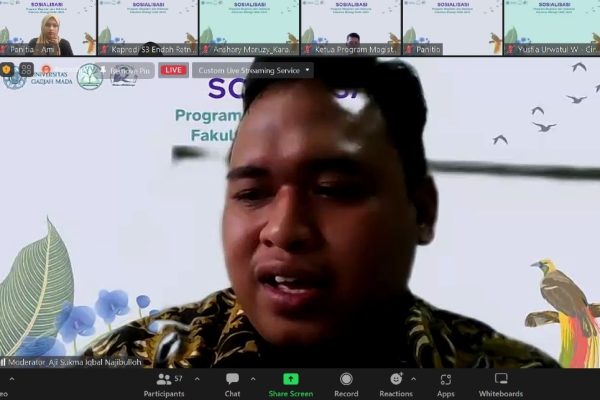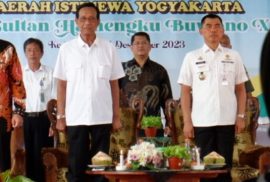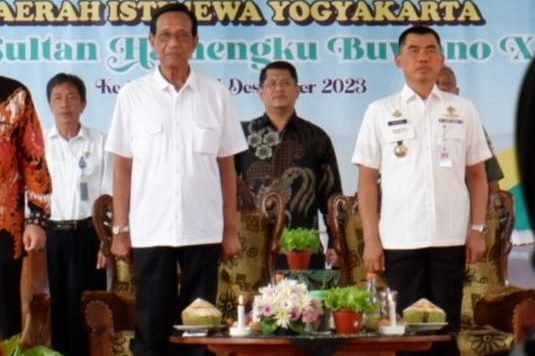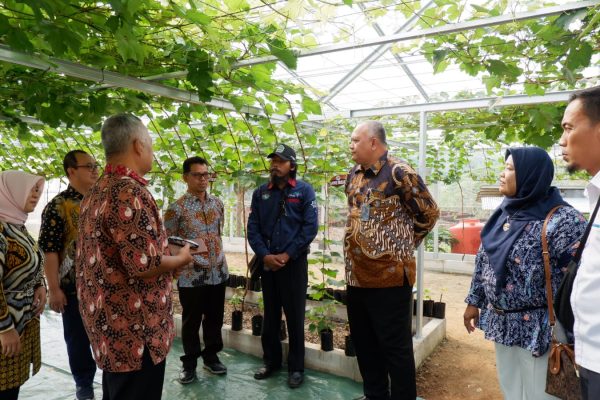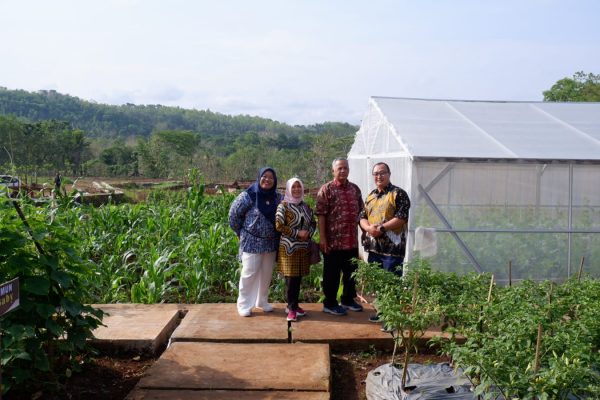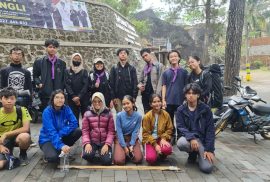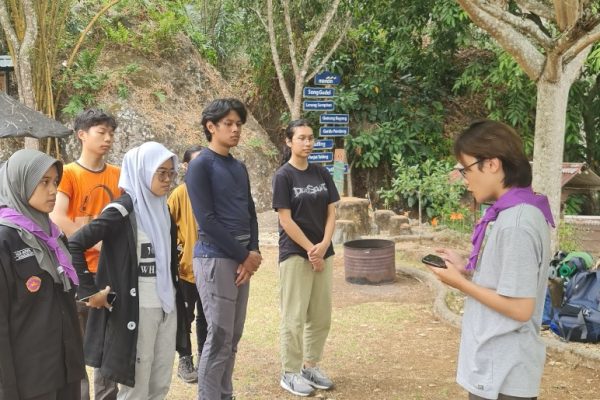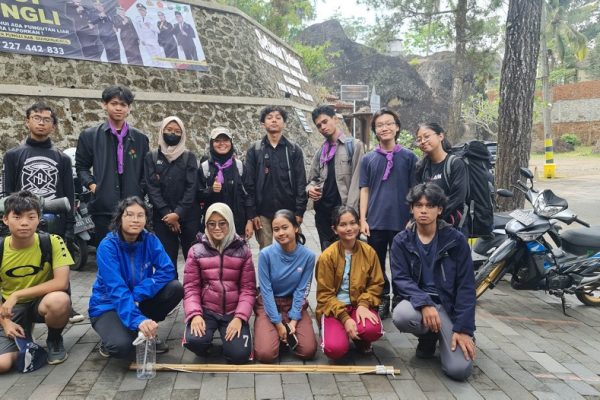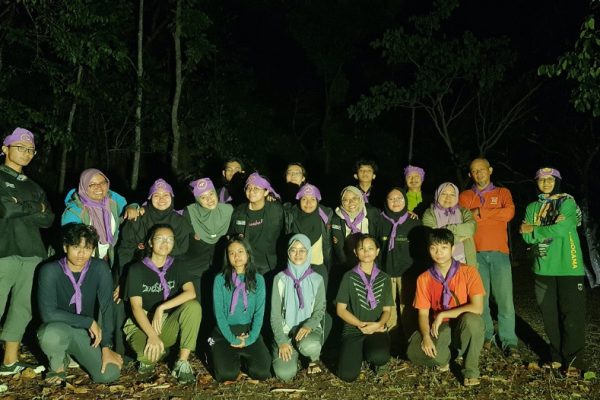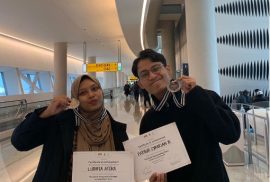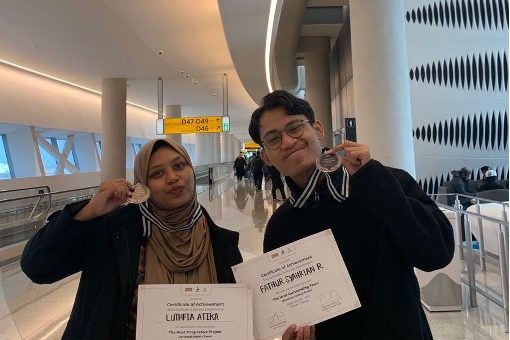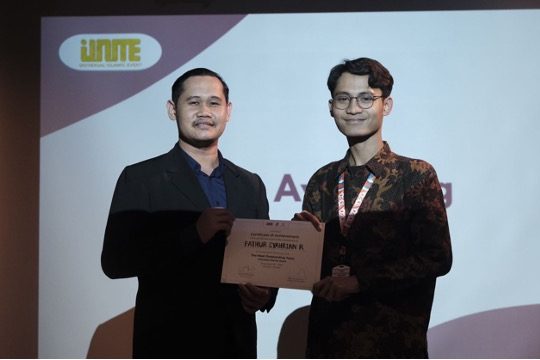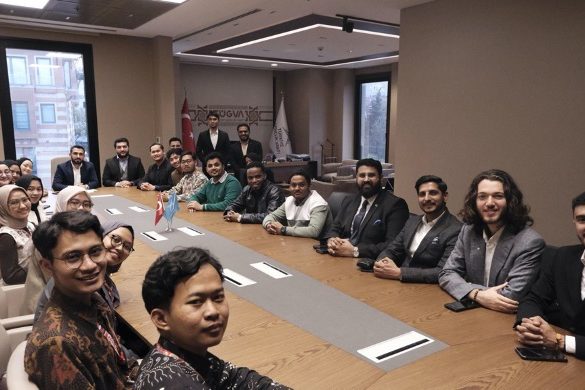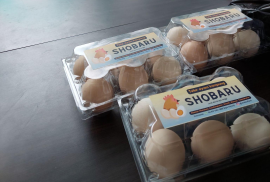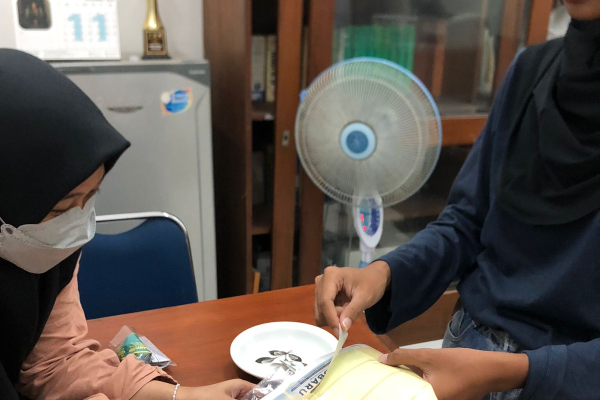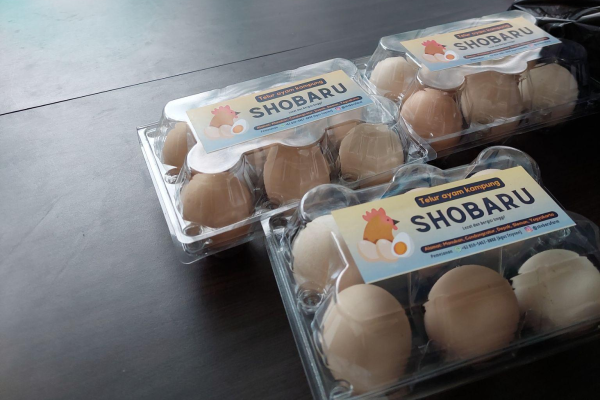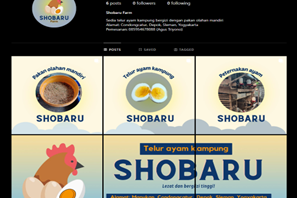<br
Mental health has now become a widely discussed issue among Generation Z. With the widespread circulation of these issues, many from Generation Z are self-diagnosing based on the prevalent signs of mental disorders. In an effort to address this issue, UGM students innovated a Mental Health Consultation Platform with a Group Mentoring Approach. This platform was innovated by Adam Satria Buana (Faculty of Geography 2020) and Sekar Alya Maharani (Faculty of Biology 2021).
This innovation was submitted to the Next Gen Entrepreneur Competition (NGEC) 2023 held by the Faculty of Industrial Technology at Ahmad Dahlan University on July 22, 2023 with the theme “Stand Out With Your Innovative Business Plan as a Future Entrepreneur” prompted both students to innovate and present a creative idea involving the development of a mental health consultation application using a group mentoring approach. The team successfully secured 3rd place among a total of 10 Grand Finalist teams representing both public and private universities in Indonesia.
Mental health issues are increasingly being discussed by the public, especially among Generation Z teenagers. According to Annury et al. in 2021, it was found that 24.80% of a total of 100 high school Generation Z teenagers across Indonesia engaged in self-diagnosis. One of the indicators is the Generation Z’s inclination toward trending topics, leading to a Fear of Missing Out (FOMO) particularly regarding current mental health discussions. Self-diagnosis is a situation where an individual assumes health issues and self-identifies as having a mental disorder without professional assistance (Kaligis, 2021). This can impact an increasing level of anxiety within the individual.
The created platform is a web application named TEMU GEN-Z, which stands for Teman CeritaMU Generasi Z (Your Generation Z Story Buddy). This name was formulated because addressing mental health issues can begin with consultations involving storytelling about the challenges one faces. TEMU GEN-Z provides a personalized touch through monitoring within discussion groups. This web application serves as a mental health support system, featuring consultation services, psychological tests, discussion groups, medication services, and #Let’sTalk content. TEMU GEN-Z has a logo symbolizing a liberated soul without internal disturbances.
The Faculty of Biology at UGM, in collaboration with KOBI (Consortium of Indonesian Biology), participated in a Focus Group Discussion (FGD) on the Implementation Instruments of the Ministry of Education, Culture, Research, and Technology Regulation No. 53 of 2023 with the Accreditation Council of LAMSAMA (Independent Accreditation Agency for Natural Sciences and Formal Sciences).The event, held at Hotel Ciputra Jakarta from December 7th to December 8th, 2023, aimed to discuss the Implementation of the Ministry of Education, Culture, Research, and Technology Regulation No. 53 of 2023, with a specific focus on accreditation for doctoral study programs. For this FGD, LAMSAMA invited the Consortium of Indonesian Biology, the Indonesian Chemical Society, Physics Society Indonesia, Indo MS, Indonesian Astronomical Society, Indonesian Geophysics Society, and MIPA Net. Prof. Dr. Budi Setiadi Daryono, M.Agr. Sc., as the Chairman of KOBI, assigned Prof. Dr. Endah Retnaningrum, M.Eng, and Zuliyati Rohmah, M.Si., Ph.D.Eng from Faculty of Biology UGM. This activity is in line with the commitment of the Faculty of Biology UGM to support Sustainable Development Goals (SDGs), particularly focusing on inclusive education quality (SDGs 4) and fostering strong collaborations (SDGs 17) to contribute to the improvement of education quality in Indonesia.
The event commenced with an opening address by Prof. Dr.-Ing. Drs. Ir. Mitra Djamal, IPU, the Director of the Executive Board of LAMSAMA, followed by a session led by Prof. Drs. Roto, M.Eng., Ph.D., to align perceptions regarding the Implementation of the Ministry of Education, Culture, Research, and Technology Regulation No. 53 of 2023. On the second day, Prof. Dr. L. Hartanto, M.Si., and Setyo Pertiwi, Dr. Ir. M.Agr., presented insights regarding the Implementation of the Ministry of Education, Culture, Research, and Technology Regulation No. 53 of 2023 for Doctoral Program Accreditation. These presentations were held in two sessions, each concluding with a discussion. Participants gained a comprehensive understanding and detailed explanations about the accreditation process for Doctoral study programs in line with the provisions of the Ministry of Education, Culture, Research, and Technology Regulation No. 53 of 2023.
The event proceeded with discussions on accreditation automation instruments led by Prof. Dr. Muktiningsih, M.Sc., and discussions on accreditation automation supplements conducted by Prof. Drs. Roto, M.Eng., Ph.D. In the Minister of Education, Culture, Research, and Technology Regulation No. 53 of 2023, Article 81 explains that the accreditation status from BAN-PT and LAM is extended through an automation mechanism. This automation mechanism involves re-accreditation without assessment by assessors, monitoring, and evaluating the quality of study programs and higher education institutions based on data and information from PD Dikti (Directorate General of Higher Education).During this session, participants engaged in discussions and exchanged information regarding accreditation automation, aiming to understand the necessary preparations for the accreditation automation process. The aim of this FGD activity is to provide an understanding of the Implementation of the Ministry of Education, Culture, Research, and Technology Regulation No. 53 of 2023, thereby contributing to the enhancement of Higher Education quality in Indonesia.
The ‘Kedaireka Matching Fund for Native Plants’ team from the Faculty of Biology UGM, led by Prof. Dr. Endang Semiarti, M.S., M.Sc., conducted a visit to East Kalimantan, specifically to Woody Park Borneo, alongside Director Drs. Lalu Fauzul Idhi, from December 7th to 9th, 2023, for the purpose of conserving indigenous plants. This collaboration primarily focuses on the cultivation development of the black orchid (Coelogyne pandurata), Ulin wood (Eusideroxylon zwageri), and pitcher plants (Nephentes spp.). The team engaged in discussions related to orchid conservation, particularly the endemic orchids of Kalimantan, which are set to be carried out in the Woody Park Borneo’s greenhouse. This aligns with Sustainable Development Goals (SDGs) 15 and 17, namely Land Ecosystems and Partnerships to Achieve Goals. Additionally, the Kedaireka team handed over 10 bottles of black orchid seedlings (C. pandurata), each containing 30 seedlings ready for acclimatization. They also received Ulin wood seedlings intended for planting in the Karanggayam greenhouse at the Faculty of Biology UGM.
In addition, the team also held discussions with Mr. Hari Purwito, the owner of Zwageri Orchid Garden, and his farming team regarding efforts to develop cultivation and conservation of pitcher plants and black orchids. They also visited the Orchid House located in the Balikpapan Botanical Garden, East Kalimantan.The strong and continuous collaboration between the Kedaireka for Native Plants Team UGM, Woody Park Borneo as an industry entity, and Zwageri Orchid Garden as local farmers/community, aimed at developing the breeding of local plants, holds significant potential in supporting the conservation of East Kalimantan’s native flora in their natural habitats.
On Sunday, November 12th, 2023, the Herpetology Study Group (KSH) conducted the KSH Srawung #2, a continuation of the previous KSH Srawung held with KSAT in July. In this event, KSH collaborated with the Biology Nature Enthusiasts of Sunan Kalijaga (BIOLASKA) from UIN Sunan Kalijaga. Similar to the first KSH Srawung, this event aimed to strengthen bonds and facilitate knowledge exchange between the two organizations. The participation rate for this event was relatively high, with 16 representatives from KSH and 8 representatives from BIOLASKA.
The KSH Srawung #2 took place in room 2 of the Sinarmas Building at the Faculty of Biology, UGM, starting from 08:30 AM until 01:00 PM local time. The event was divided into two sessions, the first session covered the identification and sampling techniques of herpetofauna, presented by Muhammad Afnisa’a Rozaqi and Anthera Al Firdaus Prissandi representatives from the KSH Senior Council. Before moving on to the second session, the event continued with a “Guess the Picture” game organized by the committee. The second session consisted of insights shared by BIOLASKA representatives, Dwi Fatmawati and Isnaini Fitriana, who shared knowledge on expedition preparation and techniques.
The KSH Srawung #2 ran smoothly from start to finish. All participants were visibly enthusiastic and actively engaged, posing questions during each knowledge-sharing session. The event concluded with a certificate presentation for each speaker and a group photo session. The hope is for even more spectacular collaborations between KSH, BIOLASKA, and other organizations involved in Herpetology in the future.
Yogyakarta, December 8, 2023 – The Faculty of Biology at Universitas Gadjah Mada (UGM) is actively involved in the formulation of the Forestry Policy for the Capital City of Nusantara. Dr. Bambang Retnoaji, M.Sc, Vice Dean for Academic and Student Affairs, represented the faculty in a public consultation held at the Royal Ambarrukmo Hotel, Yogyakarta, on December 8, 2023.
This event is a collaboration between the Capital City of Nusantara Authority and the Faculty of Forestry at Universitas Gadjah Mada. Its aim is to present the results of the forestry management plan for the Capital City of Nusantara and the draft of the regulations governing forestry implementation in the capital. The primary objective of this event is to gather input and perspectives from various stakeholders regarding the proposed management and policy formulations.
As a source of expertise, Dr. Ir. Hero Marhaento, S.Hut., M.Si. IPM, discussed the “Forestry Management Plan for Nusantara Capital,” Dr. Totok Dwi Diantoro, S.H., M.A., LLM, covered the topic of the “Draft Policy for Forest Management in Nusantara Capital,” and Cantya Paramita Marhendra, S.T., M.Sc., presented on the “Landscape Design for the Conservation Area in Nusantara Capital.” Prof Dr. Dra. Ratna Susandarini, M.Sc., from the Faculty of Biology at UGM, moderated the event.
During the occasion, the Faculty of Biology at UGM provided five key points of input, including:
- Human Environment Cross Interaction: Emphasizing the importance of interaction between humans and their environment for ecosystem sustainability.
- Bio-Prospecting: Highlighting the exploration of biodiversity as a source of innovation and deeper understanding of biological diversity.
- Circular Bio-Economy Concept: Introducing the concept of sustainable economics prioritizing the recycling of biological resources.
- Community/Citizen Education Behavior: Stressing the crucial role of public education in supporting forestry policies.
- Potency Invasive Species: Offering insights into the potential and risks associated with invasive species in the context of forestry in the Capital City of Nusantara.
The active participation of the Faculty of Biology at UGM in this consultation aligns with the achievement of Sustainable Development Goals (SDGs) 11, “Sustainable Cities and Communities,” and SDGs 17, “Partnerships for the Goals.”
The Faculty of Biology Universitas Gadjah Mada successfully conducted an Open House event: Introduction to the Master’s and Doctoral Programs through Regular, by Research, and Double-Degree LPDP pathways on Saturday, December 2, 2023. This event was held online through Zoom Meeting aimed to provide information about the Master’s and Doctoral programs at the Faculty of Biology, UGM, to prospective students. The session included explanations about the three admission pathways for new students: Regular, by Research, and Double-Degree LPDP. The discussions covered program descriptions, curriculum structures, offered courses, as well as various research and scientific development opportunities in the field of biology. The event, led by Ummu Intan Kinasih, S.Si., was attended by 60 participants with diverse backgrounds and from various regions across Indonesia.
This activity included presentations by Dr. Eko Agus Suyono, M.App.Sc., as the Vice Dean for Research, Community Service, Collaboration, and Alumni Affairs ; Dr.rer.nat. Andhika Puspito Nugroho, S.Si., M.Si., as the Head of the Master in Biology Study Program ; and Prof. Dr. Endah Retnaningrum, M.Eng, as the Head of the Doctor in Biology Study Program in the Faculty of Biology UGM. Additionally, there were sharing sessions facilitated by Ariel Hananya, S.Si., M.Sc., an alumnus of the Master in Biology Study Program, and Dr. Junaidi, S.P, M.Sc., Ph.D., an alumnus of the Doctor in Biology Study Program.
The event began at 09:00 WIB, hosted by Syefrina Rosyada, S.Si., commenced with the singing of the Indonesian national anthem, the Universitas Gadjah Mada Hymn, and theMars of Faculty of Biology. Subsequently, there was a presentation session guided by Aji Sukma Iqbal Najibulloh, S.Si., a postgraduate student from the Faculty of Biology. In the first session, Dr. Eko Agus Suyono, M.App.Sc., provided a concise overview of the profile, research, publications, community service, collaboration, and alumni activities of the Faculty of Biology UGM. Following that, Dr. rer. nat. Andhika Puspito Nugroho, S.Si., M.Si., delivered the second presentation on the vision, mission, graduate profile, number of graduates, degrees, facilities, ASIIN accreditation, admission pathways (regular and by research), curriculum, registration stages, requirements, and schedules for the Master in Biology Study Program. The third presentation was delivered by Prof. Dr. Endah Retnaningrum, M.Eng, covering the vision, mission, graduate profile, number of graduates, degrees, facilities, pathways (regular and by research), curriculum structure, stages, and specific admission requirements for the Doctor in Biology Study Program.
The alumni sharing session commenced with Ariel Hananya, S.Si, M.Sc., who shared experiences and organizations during their Master’s studies in Biology UGM, benefits obtained after entering the program, and career prospects for Biology graduates in national and international companies. Dr. Junaidi, S.P, M.Sc., Ph.D., an alumnus of the Doctoral Program in Biology, shared experiences of studying with various scholarships at Colorado State University, the SEARCA scholarship, and the Double-Degree program at the University of Montpellier and the Doctoral Program at the Faculty of Biology, UGM. After the presentation and alumni sharing sessions concluded, there was a question-and-answer session for both the Master’s and Doctoral programs in Biology at UGM.. Participants were highly enthusiastic in asking questions, and all queries were well addressed by the speakers. The event concluded with closing remarks from the host.
The implementation of this Open House event, introducing the Regular, by Research, and Double-Degree LPDP Master’s and Doctoral Program in the Faculty of Biology at UGM, played a crucial role in familiarizing prospective students with the offered programs. It provided detailed information about the structure, registration requirements, curriculum, and facilities while facilitating interactions between prospective students and faculty members. Additionally, it encouraged information exchange, sparked interest among prospective students, and offered a platform for discussions regarding admissions and requirements for the Master’s and Doctoral Programs in the Faculty of Biology at UGM. Therefore, this event was expected to provide comprehensive information and assist prospective students in making informed decisions about pursuing Master’s and Doctoral education in the field of Biology. The event recording was available for review on the Kanal Pengetahuan Fakultas Biology Channel on YouTube.
On Monday, December 4th, the Dean of the Faculty of Biology at UGM, Prof. Dr. Budi Setiadi Daryono, M. Agr.Sc., along with the Vice Dean for Research, Community Service, Collaboration, and Alumni Affairs, Dr. Eko Agus Suyono, M.App.Sc., responded to an invitation from the Head of Kedungpoh Village to accompany the Governor of the Special Region of Yogyakarta, Sri Sultan Hamengkubuono X, at the inauguration of the Mataraman Granary in Kedungpoh. The Mataraman Granary in Kedungpoh is an area dedicated to organic integrated farming managed voluntarily by a collaboration of 10 Women Farmers Groups (KWT) in Kedungpoh, funded by the Special Region of Yogyakarta. Covering an area of 1.6 hectares, the Mataraman Granary features three greenhouses for melon and grape cultivation, seedlings, two fish ponds, and a cattle pen housing 5 cows. Currently, plans are underway to construct an additional greenhouse for organic chrysanthemum cultivation intended for chrysanthemum tea and chrysanthemum leaf chips.
Since 2019, Kedungpoh has been a partner village of the Faculty of Biology at UGM. The Community Service Team accompanying this village includes Drs. Hari Purwanto, MP, Ph.D., Soenarwan Hery P., S.Si.,M.Kes., Dwi Umi Siswanti, S.Si.,M.Sc., and Ludmilla Fitri Untari, S.Si.,M.Sc. This team has been assisting Kedungpoh Village in achieving its vision as an edu-tourism village based on local potential, focusing on honey bee farming, integrated organic farming, and community forests. The Community Service Team’s performance has been recognized and has received funding from CSR PLN from 2019 to 2023, and the support is expected to continue into 2024.
During the inauguration of the Mataraman Granary, the Governor of the Special Region of Yogyakarta, accompanied by the Regent of Gunung Kidul, also officially opened the Eduwisata Kampung Madu Kedungpoh Lor, which is a partner of the Community Service Team of the Faculty of Biology and CSR PLN. Eduwisata Kampung Madu is a tripartite project involving the Natural Honey Livestock Group, Faculty of Biology at UGM, and CSR PLN. This project has resulted in infrastructure development and various training programs. These include the construction of a late afternoon market infrastructure, a training pavilion, a production house for bofertilizer and vermicompost, greenhouses for organic farming, video production and publication workshops, training for biofertilizer and vermicompost production, micro, small, and medium enterprises (UMKM) training, community-based tourism (pokdarwis) training, procurement of honeybee hives, and the establishment of camping ground infrastructure in the community forest.
” We hope that the Mataraman Granary and the Eduwisata Kampung Madu will serve as pillars for the economy of Kedungpoh Village, discouraging further urbanization,” expressed the Governor of the Special Region of Yogyakarta. The Governor’s hope is encapsulated in the slogan “Nandur apa sing di pangan, mangan apa sing di tandur,” which means planting what is eaten and consuming what is planted. The Dean of the Faculty of Biology at UGM responded to the Governor’s hope by stating, “The Faculty of Biology is not just an educational institution but an establishment that must benefit our nation, especially the surrounding communities.” Furthermore, the Vice Dean for Research, Community Service, Collaboration and Alumni Affairs expressed his hopes, “I expect the Community Service Team in Kedungpoh to continue this collaboration next year. The faculty will allocate funds for the partner village and the Community Service Learning Program that can be utilized as a stimulus for service programs here.”
The development of the Mataraman Granary, Eduwisata Kampung Madu, and the Community Service Program by the Faculty of Biology at UGM actualizes SDGs 1, 5, and 17: No Poverty in Villages, Involvement of Women in Villages, and Partnerships for Village Development. Congratulations to Kedungpoh Village.
Field Training is the culmination of the CAM XXVI Basic Training and Education series that has been conducted over the past few weeks. The purpose of this Field Training activity is to assess CAM XXVI based on the material they have received during the Basic Training and to officially induct the CAM (Prospective Young Members) as AM (Young Members). This event took place over two days and one night, from November 4th to 5th, 2023, at Mount Nglanggeran Ancient Volcano, Nglanggeran Village, Patuk District, Gunung Kidul Regency, in the Special Region of Yogyakarta. The activity was attended by 6 CAM XXVI participants, 6 AMs, and 7 senior members as the organizing committee, 5 Matalabiogama alumni as honorary members, and 1 lecturer serving as the Matalabiogama mentor.
The XXVI Field Training activity began with the arrival of CAM and the committee at 10:00 AM local time at Mount Nglanggeran Ancient Volcano. After a brief rest, the opening ceremony of the XXVI Field Training commenced, followed by a final assignment presentation given to CAM XXVI regarding activity planning, accompanied by a Q&A session. Subsequently, there was a rearrangement of bags to be carried during the nature exploration. In this exploration, CAM XXVI divided into two groups, embarked on a trek toward the summit of the ancient volcano, reaching 700 meters above sea level with four designated stopping points. During this activity, CAM members were tested on their understanding of caving equipment, case studies, first aid for accidents, and setting up a bivouac. The activities of the first day concluded with a group documentation at the peak of Mount Nglanggeran Ancient Volcano and the pitching of tents at the campsite.
On Sunday, November 5th, 2023, at 03:15 AM, CAM XXVI were awakened to participate in the induction ceremony as Young Members of Matalabiogama XXVI. On that day, six members were officially inducted: Muhammad Fazli Makatita, Naomi Zola Sebayang, Golda Theresia Simarmata, Husna Nadia, Geraldine Yara Amritarashmi, and Dharma Kiart Wijaya. Additionally, five members, Sulthon Fatih, Adrian Pradipto Harmawan, Rizal Alfarizan Ramadhan, Layla Oktavia, and Ikhlasul Amal, were conditionally inducted pending the fulfillment of specific requirements within the shortest possible time. The induction of young members involved a ceremonial sprinkling of flower water as a symbol of purification and the commencement of a new phase within Matalabiogama dynamics, followed by the wearing of scarves around their necks as a symbol of membership as Young Members of Matalabiogama Diklat XXVI.
Following the induction, there was a sharing session and breakfast with attending alumni. The XXVI Field Training activities concluded with a cleanup of the camping area and a documentation session. Subsequently, all participants and committee members of the Field Training returned to the Faculty of Biology, Gadjah Mada University. Vivat et Floreat!
UNITE is an International Conference program involving students from various prestigious universities worldwide. This activity is part of the ‘Rumah Kepemimpinan’, a self-development program for students in Indonesia. The conference aims to provide opportunities for youth to discuss, interpret the history of Islam, and create ideas that can enhance the impact on the environment with the spirit of Islamic civilization.
This year, UNITE took place from November 14th to 22nd, 2023, in Istanbul, Turkey, marking the second implementation of the program. This time, UNITE sent 7 student delegates from Indonesia representing various universities, including two from Universitas Gadjah Mada: Fathur Syahrian Ramadhani (Biology 2020) and Luthfia Nurul Atikah (International Relations 2019). Additionally, the conference was attended by student delegates from various countries such as Turkey, Yemen, Egypt, Morocco, Pakistan, Ethiopia, and Myanmar. These delegates were selected through a series of assessments including administrative tests, interviews, and project presentations.
Before the departure, Fathur underwent approximately 4 months of preparation, including Islamic historical insight, mentoring projects, team management, and fundraising. Each delegate prepared an ideas pitching session which was presented during the conference. The conference, held at the Turkish Youth Foundation (TÜGVA), an organization empowering youth to uphold justice and create various works worldwide, proceeded smoothly.
The activities commenced with seminars by three speakers: Mohammed Abdulhameed, Fatema Soliman, and Muhammad Anas. Each presented three distinct topics: “The Role of Youth as Innovators,” “Research as The Initial Gate to Innovate,” and “The Spring of Islamic Civilization.” Subsequently, the event continued with Focus Group Discussions (FGDs) among student delegates to discuss educational topics for youth worldwide.
From this conference, the three speakers also served as judges for the delegate projects, and Fathur received the “Best Presentation” award, while Luthfia received the “Best Social Project” award out of the three available awards.That achievement is a proud accomplishment for Universitas Gadjah Mada. “Participating in UNITE is something I am grateful for because of the various benefits, from learning through mentorship preparation, improving English speaking skills, engaging in discussions with international students, to studying the history of Islam at various historical sites in Turkey. Furthermore, with support from the delegates and judges, I am inspired to continue my project plan in the future,” said Fathur. Fathur himself brought an idea for a project he initiated back in 2021, called Hirau, a community of young people focused on advocating for environmental issues. These accomplishments were undoubtedly a result of support from the faculty, university, and those around him. [Author: Fathur Syahrian Ramadhani]
[MBKM-PkM] The Independent Learning Independent Campus (MBKM) Community Service Program team from the Faculty of Biology, UGM, led by Prof. Dr. Endah Retnaningrum, M.Eng., along with four students Avila Kusuma W, Daimeera Anja, Shanaz Dhiya’ul Haq, and Syahidina has been conducting socialization and mentoring sessions with “Shobaru” livestock farmers in Condong Catur Village, Sleman, Yogyakarta, from October to November 2023.
The mentoring aimed to improve the quality of the local chicken eggs through the provision of fermented feed. The quality of these eggs is enhanced compared to those from non-fermented feed. The local chicken eggs have a richer taste and a stronger yolk color due to their high β-carotene content. This improvement is attributed to the higher nutritional content and better digestibility of fermented feed for the poultry. Moreover, providing fermented feed increases the animals’ appetite while reducing the odor from their waste. Additionally, fermented feed serves as a cost-effective alternative to commercial feed, which tends to be more expensive. The team also conducted socialization and mentoring on branding and online marketing of the local chicken eggs through social media platforms, including guidance on managing social media accounts. Packaging the local chicken eggs with branding has expanded their market reach, allowing consumers to locate and contact the local chicken egg farmers, thereby increasing the product’s visibility.
Through the MBKM Community Service activities by the Faculty of Biology, UGM, the “Shobaru” livestock farmers have seen improvements in both the quality of their egg products and their marketing strategies. This has led to sustained economic prosperity for the community while also contributing to environmental preservation.

